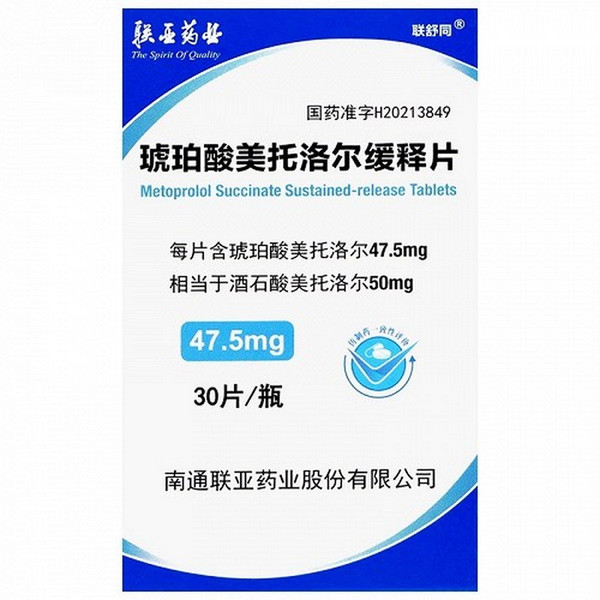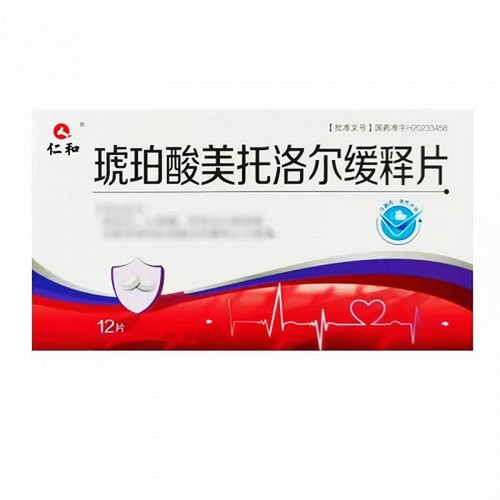Product Overview
[Drug Name]
Generic Name: Metoprolol Succinate Sustained-Release Tablets
Trade Name: Lianshutong Metoprolol Succinate Sustained-Release Tablets 47.5mg*30 Tablets
Pinyin Full Code: LianShuTongZuoZuoSuanMeiTuoLuoErHuanShiPian 47.5mg*30 Tablets
[Main Ingredient]
The main ingredient of this product is metoprolol succinate. Chemical Name: 1-Isopropylamino-3-[p-(2-methoxyethyl)phenoxy]-2-propanol L(+)-succinate. Molecular Formula: (C₁₅H₂₅NO₃)₂•C₄H₂O₄). Molecular Weight: 652.82
[Properties]
23.75mg: This product is a white, oval, biconvex tablet with a scoreline on both sides and "N" and "25" engraved on one side. 47.5 mg: This product is a white, round, biconvex tablet, scored on both sides and engraved with "N" and "50" on one side. 95 mg: This product is a white, round, biconvex tablet, scored on both sides and engraved with "N" and "100" on one side. 190 mg: This product is a white, oval, biconvex tablet, scored on both sides and engraved with "N" and "200" on one side.
[Indications/Main Functions]
Hypertension, angina pectoris, and stable chronic heart failure with symptoms of left ventricular systolic dysfunction.
[Specifications]
47.5 mg x 30 tablets
[Dosage and Administration]
Oral, once daily, preferably in the morning. The tablet may be broken but not chewed or crushed. It should be taken with at least half a cup of liquid. Concomitant food does not affect its bioavailability. Dosage should be individualized to avoid bradycardia. The following are effective dosing guidelines: For hypertension, 47.5-95 mg once daily. Patients who do not respond to 95 mg can be treated with other antihypertensive drugs, preferably diuretics and dihydropyridine calcium channel blockers, or the dose can be increased. For angina, 95-190 mg once daily. Nitrates can be used or the dose increased as needed. Long-term use can reduce the frequency of angina attacks and improve myocardial tolerance. In stable heart failure, it can be used in combination with angiotensin-converting enzyme inhibitors, diuretics, and possibly digitalis (for other details, see the package insert).
[Adverse Reactions]
See the package insert for details.
[Contraindications]
Cardiogenic shock. Sick sinus syndrome type I, high-degree atrioventricular block. Patients with unstable, decompensated heart failure (pulmonary edema, hypoperfusion, or hypotension) who are receiving continuous or intermittent inotropic therapy with beta-agonists. Symptomatic bradycardia or hypotension. This drug should not be administered to patients with suspected acute myocardial infarction and a heart rate <45 beats/min, a P-Q interval >0.24 seconds, or a systolic blood pressure <100 mmHg. Patients with heart failure indications whose supine systolic blood pressure is consistently below 100 mmHg should have their eligibility for this drug reassessed before starting treatment. This also applies to patients with severe peripheral vascular disease who are at risk of gangrene. Patients with a hypersensitivity to any component of this drug or other beta-blockers.
[Precautions]
Verapamil should not be administered intravenously to patients receiving beta-blockers. Metoprolol may exacerbate symptoms of peripheral circulatory disorders, such as intermittent claudication. Caution is advised in patients with severe renal impairment, acute conditions associated with metabolic acidosis, and when used concomitantly with digitalis. In patients with Prinzmetal's angina, the use of beta-blockers may increase the frequency and severity of angina attacks due to alpha-receptor-mediated coronary vasoconstriction. Therefore, non-selective beta-blockers should not be used in such patients. Selective beta-1 blockers should also be used with caution. Patients with bronchial asthma or other chronic obstructive pulmonary diseases should be given adequate bronchodilator therapy concurrently, and the dose of the beta-2 agonist may need to be increased. Metoprolol therapy has a lower impact on glucose metabolism or the risk of masking hypoglycemia than non-selective beta-blockers. In rare cases, pre-existing moderate atrioventricular conduction abnormalities may worsen (possibly leading to atrioventricular block). Beta-blocker therapy may interfere with the treatment of allergic reactions, and conventional doses of epinephrine do not always yield the desired effect. If metoprolol succinate is used in patients with pheochromocytoma, concomitant use of an alpha-blocker should be considered. Limited controlled clinical trial data are available on the efficacy and safety of metoprolol in patients with severe, symptomatic stable heart failure (NYHA IV). Therefore, treatment of such patients should only be initiated by experienced and well-trained physicians. Clinical studies of heart failure typically exclude patients with symptomatic heart failure associated with acute myocardial infarction and unstable angina. Therefore, data on the efficacy and safety of this drug in the treatment of patients with concurrent acute myocardial infarction and heart failure are lacking. This drug is contraindicated in patients with unstable, decompensated heart failure. Abrupt discontinuation of metoprolol succinate extended-release tablets should be avoided, as this may worsen chronic heart failure and increase the risk of myocardial infarction and sudden death, particularly in high-risk patients. Therefore, this drug should be withdrawn gradually, over at least two weeks, with the dose reduced by half each time until the final dose is half a 23.75 mg tablet. The last dose should be given at least four days prior to discontinuation. If symptoms develop, a more gradual withdrawal is recommended. If this drug is to be discontinued before surgery, it must be discontinued at least 48 hours in advance, unless there are specific circumstances, such as thyrotoxicosis and pheochromocytoma. The anesthesiologist should be informed before surgery that the patient has been treated with metoprolol succinate extended-release tablets. Discontinuation of beta-blocker therapy is not recommended for patients undergoing surgery. Avoid rapidly initiating high-dose metoprolol in patients undergoing noncardiac surgery because rapid initiation of high-dose metoprolol therapy may result in bradycardia, hypotension, and stroke, including possible death in patients with established cardiovascular risk factors. Use with caution in athletes. Effects on Driving and Operating Machinery: Dizziness and fatigue may occur during treatment with this medication; therefore, caution should be exercised when using this medication during activities requiring concentration, such as driving and operating machinery.








